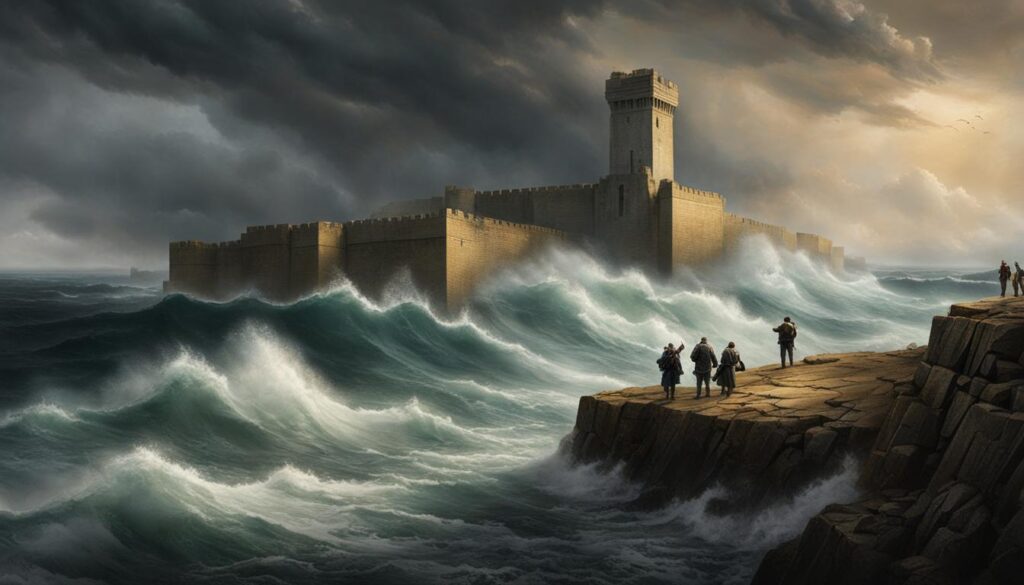Looking for a gripping audiobook to add to your list? Look no further than John Lanchester’s “The Wall,” a thought-provoking novel that explores a dystopian reality with deep insights. In this comprehensive audiobook review, we’ll dive into the captivating world created by Lanchester and gain valuable insights into this compelling story.
Whether you’re a fan of dystopian literature or searching for your next audiobook experience, “The Wall” is sure to deliver. Keep reading for a detailed exploration of this must-read novel and its impact on the literary landscape.
Overview of “The Wall”
“The Wall” by John Lanchester is a dystopian novel that explores a future world in which society has collapsed due to climate change and immigration issues. The story is set in the near future in a society where environmental disasters have led to the formation of a new authoritarian government that functions to protect the remaining population.
The book is characterized by a world-building that depicts a society on the brink of collapse, where young people are forced to defend the borders against outsiders who are seen as a threat to the remnants of civilization. The story follows the life of a young man as he begins his service to the nation and comes to grips with the realities of the society he now inhabits.
Throughout the novel, Lanchester explores themes of survival, isolation, and societal collapse, as well as the impact of climate change and immigration on the world. His masterful storytelling and nuanced portrayal of complex issues make “The Wall” both engaging and thought-provoking.
Key Concepts in “The Wall”
| Dystopian Society | Societal Collapse | Immigration | Climate Change |
|---|---|---|---|
| The society depicted in “The Wall” is a dystopian one, characterized by rigid rules, government surveillance, and the forced isolation of youth. | The novel takes place in a world on the brink of collapse, where the remaining population must defend itself against intruders. | The impact of immigration is a central theme in the novel, leading to societal conflict and distrust between people. | The world of “The Wall” is a consequence of a climate change future, where rising sea levels and changing weather patterns have devastated the planet. |
Introduction to John Lanchester
Acclaimed author John Lanchester is known for his compelling stories that tackle complex societal issues. Born in Germany and raised in Hong Kong, Lanchester moved to England to study at Oxford University before becoming a journalist and columnist for publications such as The New Yorker and The Guardian.
He published his first novel, “The Debt to Pleasure,” in 1996, which won the Whitbread Book Award for First Novel. Lanchester has since written a diverse range of works, including “Mr. Phillips,” “Fragrant Harbour,” and “Capital,” which was adapted into a BBC television series.
Lanchester’s writing style is known for its sharp wit, keen observations, and ability to transport readers into his fictional worlds. He has a unique talent for weaving together intricate plots and multi-dimensional characters to create a gripping story with an underlying social commentary.
Through “The Wall,” Lanchester further showcases his knack for dystopian storytelling and his ability to comment on the societal issues that shape our world.
John Lanchester’s Works
| Novels | Publication Year |
|---|---|
| The Debt to Pleasure | 1996 |
| Mr. Phillips | 2000 |
| Fragrant Harbour | 2002 |
| Capital | 2012 |
| The Wall | 2019 |
Get to know the mind behind “The Wall” through John Lanchester’s impressive body of work that spans complex narratives and diverse subject matter.
Plot Summary of “The Wall”
As the novel opens, readers are introduced to Kavanagh, a young defender newly assigned to the Wall, a towering structure that protects their island nation from the rising sea levels. Living in a world where society has collapsed due to climate change, the threat of “Others” looms over them. These are desperate people trying to escape their own sinking countries and hoping to make it into the safety of the nation guarded by the Wall.
Despite facing exhaustion, hunger, and harsh conditions, Kavanagh takes pride in his work, until a tragic incident leads him to begin questioning the purpose of the Wall. As his worldview expands, Kavanagh must navigate conflicting loyalties and moral dilemmas while grappling with the harsh realities of his world.
The narrative takes readers on a rollercoaster ride of emotions as they follow Kavanagh’s journey through the plot’s twists and turns. Heart-wrenching moments are punctuated by brief moments of hope, preventing this dystopian novel from becoming a one-note tale of despair. The conclusion of the novel is both gripping and satisfying, offering readers resolution and closure.

Key Events:
| Event | Summary |
|---|---|
| The Tragedy | Kavanagh loses his partner, Hifa, while defending the Wall. |
| The Discovery | Kavanagh discovers a deep sense of empathy for the Others outside the Wall, causing him to question his duties and loyalties. |
| The Capture | Kavanagh’s beliefs are tested further when he experiences a difficult moral decision while capturing an Other. |
| The Escape | Kavanagh helps facilitate an escape plan, putting his life and loyalties at risk. |
| The Decision | Kavanagh ultimately decides to leave the Wall behind and begins a new chapter in his life. |
Continue reading to explore the deep themes and character development explored in “The Wall.”
Analysis of Themes in “The Wall”
“The Wall” by John Lanchester explores various themes that are highly relevant to the contemporary world. In this section, we will analyze the three dominant themes of the novel, namely, societal collapse, survival, and isolation.
Societal Collapse
One of the central themes of “The Wall” is the collapse of society as we know it. Lanchester presents a world that has been destroyed by climate change, and now faces the imminent threat of flooding. The remnants of civilization cling to authoritarian regimes that rely on the myth of “protecting our own.” The Wall, a physical manifestation of the desperation that grips society, is the only thing that stands between humanity and the rising tides. Through this dystopian world, Lanchester highlights the consequences of our actions and inactions, serving as a grim warning of what could be if we continue to ignore the catastrophic effects of climate change.
Survival
“The Wall” also explores the theme of survival, as the protagonist confronts the hardships of life within The Wall. The harsh environment and grueling demands of service at The Wall force the protagonist to rely on their survival instincts to survive. They grapple with their own capacity for violence and the realization that the only way to survive is by abandoning their humanity and empathy. This theme raises important questions about what it means to be human and challenges readers to consider the lengths they would go to survive in a similar situation.
Isolation
Isolation is another critical theme present in “The Wall.” The protagonist’s tour of duty at The Wall is characterized by desolation and loneliness, providing a profound reflection on the human psyche. Lanchester shows how isolation can drive humans to madness, paranoia, and even cause them to question their own sanity. The Wall represents a dystopian metaphor for a world in which isolation and separation are encouraged and championed, serving as a stark reminder of the importance of human connection.
In conclusion, “The Wall” by John Lanchester is a thought-provoking exploration of societal collapse, survival, and isolation. The three dominant themes of the novel provide valuable insights into the human condition and prompt critical reflection on our current society. Lanchester crafts a dystopian world that is both chilling and captivating, providing readers with a literary experience that will linger long after the final page has been turned.
Character Development in “The Wall”
John Lanchester creates well-crafted characters in “The Wall” that undergo significant development throughout the novel. The protagonist’s journey is a particularly compelling aspect of the story, as they confront the harsh realities of their world and adapt to survive. The supporting cast also plays a vital role in the narrative, adding depth and complexity to the story.
As the characters face adversity, their relationships also evolve, showcasing the impact of their experiences on their emotional and psychological well-being. Lanchester’s masterful use of character arcs creates a sense of realism and emotional connection that draws the reader into the story.
The Protagonist
The protagonist of “The Wall” experiences a dramatic character arc throughout the novel. They begin as a somewhat naive and idealistic character but are forced to confront the realities of their society and the challenges they face. As the story progresses, the protagonist must adapt and change to survive, showcasing their resilience and strength in the face of adversity.
Supporting Cast
The supporting cast in “The Wall” adds depth and complexity to the narrative, showcasing the impact of societal collapse on individuals. The characters are well-crafted and undergo significant development throughout the novel, adding texture and nuance to the story.
Evolution of Relationships
As the characters face challenges and adapt to their changing circumstances, their relationships with one another also evolve. The impact of isolation and survival instincts are explored, showcasing the impact of extreme circumstances on human connection.
Narration and Audiobook Experience
One of the most remarkable aspects of “The Wall” is undoubtedly the audiobook narration. The voice acting provided an immersive experience that drew us into the world created by Lanchester.
The narrator’s ability to convey the characters’ emotions, thoughts, and desires added depth to the story’s themes. The pacing and tone were perfectly pitched, keeping us engaged with the narrative from start to finish.
The auditory format provided us with an extra level of immersion, strengthening the emotional impact of the story’s key events. With each spoken word, we felt like we were right there alongside the characters.
The voice actor’s use of different accents and vocal inflections to differentiate between characters was particularly impressive. It added to the audiobook’s overall authenticity and made it easy to distinguish between the different players in the narrative.
Overall, the audiobook narration of “The Wall” enhanced our enjoyment of the story, providing a fully immersive experience that kept us captivated throughout.
Writing Style and Language in “The Wall”
John Lanchester’s writing style in “The Wall” is characterized by descriptive language and a strong emphasis on world-building. His storytelling techniques use vivid imagery and sensory details to immerse readers in a dystopian reality where societal collapse, survival, and the implications of isolation are explored in depth.
The use of multiple perspectives and a non-linear narrative structure adds depth and complexity to the story. Lanchester’s language is both accessible and engaging, making the novel an enjoyable read for a wide audience.
The overall impact of Lanchester’s writing style and language in “The Wall” is a captivating and thought-provoking novel that offers valuable insights into complex societal issues.
“The Wall” showcases John Lanchester’s unique ability to create a rich and immersive literary experience through his writing style and language. The combination of gripping storytelling and insightful commentary on current societal issues makes “The Wall” a must-read for fans of dystopian novels and literary fiction.
Critical Reception of “The Wall”
“The Wall” by John Lanchester has received critical acclaim for its thought-provoking story, gripping narrative, and exploration of complex societal issues. Reviewers have praised Lanchester’s ability to create a dystopian world that feels eerily relevant to our current world.
Critical Acclaim
According to The Guardian, “The Wall” is a “slow-burn, allegorical novel that paints a scarily convincing future for Britain.” The New York Times describes it as a “bleak but strangely buoyant tale of survival in the face of hardship.”
Reviews
Reader reviews of “The Wall” on Goodreads are generally positive, with an average rating of 3.66 out of 5. Many readers praise the book’s themes of survival, societal collapse, and the human spirit. Some found the ending unsatisfying or the pacing slow.
Reader Opinions
Readers have shared their opinions on “The Wall” across social media platforms, with many discussing the timeliness of its themes. Some have drawn comparisons to current political events, while others have found it to be a cautionary tale about the consequences of climate change and societal divisions. Overall, reader opinions are varied, but many appreciate the novel’s thought-provoking message.
Comparison to Other Dystopian Novels
Dystopian literature has fascinated readers for decades, and “The Wall” by John Lanchester is a worthy addition to the genre. One of the defining characteristics of dystopian novels is a bleak, oppressive society where individual freedoms are curtailed by a powerful authoritarian government. Lanchester’s “The Wall” presents a world where society is on the brink of collapse due to the impact of climate change, a lack of resources, and an influx of immigrants.
Comparing Lanchester’s work to other renowned dystopian novels such as George Orwell’s “1984” and Margaret Atwood’s “The Handmaid’s Tale” reveals several similarities and differences. All three novels explore the theme of a society in crisis, highlighting the dangers of totalitarianism, and the need for individual agency.
“1984” vs “The Wall”
| Aspect | “1984” by George Orwell | “The Wall” by John Lanchester |
|---|---|---|
| Government Control | Bureaucratic control over every aspect | Structural control through The Wall |
| Protagonist | Active and engaged in rebellion | Passive and only has limited agency against circumstances |
| Similarity | Both show the dire nature of constant watch and near-omnipotent control | The idea of the omnipotent and insurmountable wall looms over the world |
“The Handmaid’s Tale” vs “The Wall”
| Aspect | “The Handmaid’s Tale” by Margaret Atwood | “The Wall” by John Lanchester |
|---|---|---|
| Oppression of Women | Political control through the reduction in agency for women | Structural control through The Wall impacts both men and women equally |
| Government Control | Religious control and totalitarianism | Structural control through The Wall |
| Similarity | Both highlight the crucial role of individual action and small resistance against totalitarianism | Both narrate a world fragmenting and the people striving to cope with it |
The comparison between “The Wall” and other dystopian novels provides valuable insights into how Lanchester’s work fits into the wider genre. While sharing some similarities with other works, “The Wall” distinguishes itself through its emphasis on the structural, rather than bureaucratic controls, and the impact of climate change.

Societal Relevance of “The Wall”
John Lanchester’s “The Wall” is a book that tackles relevant societal issues and political commentary. The novel’s exploration of themes such as immigration, climate change, and societal divisions reflects current real-world challenges, making it an insightful read for those interested in critical thinking.
| Societal Issues | Political Commentary | Relevance |
|---|---|---|
| Immigration: Examines the consequences of closed borders and its impact on individuals and society. | Climate Change: Raises questions about society’s responsibility for environmental challenges. | Real-World Challenges: Prompts thought-provoking analysis on issues that are continuously debated globally. |
| Societal Divisions: Explores the effects of polarizing opinions on a society and how they lead to conflict. | Power Struggles: Reveals how a society’s leaders use certain crises to maintain power and control. | Essential Read: Provides a unique perspective that is arguably more relevant today than ever before. |
Understanding Immigration and Climate Change
The novel reveals a society built on exclusion, where people are either part of the Wall or outside it, struggling to survive. It is a reflection of the current global challenges created by immigration policies, economic inequality, and climate change. By highlighting the consequences of closed borders, resource scarcity, and environmental degradation, Lanchester offers insights into the complex issues of our times.
Promoting Critical Thinking
Through his storytelling, Lanchester encourages readers to consider the complexities of social, economic, and environmental issues. He reveals the power dynamics at play in society and how they shape the lives of individuals and communities. Thus, “The Wall” is a valuable read for anyone looking to explore politics, social issues, and the human condition.
- Key Takeaways:
- Provides a social commentary of our modern world
- Promotes critical thinking on pressing societal issues
- Offers insight into the psychological impact of societal collapse
Impact of “The Wall” on Literature and Readers
Since its release, John Lanchester’s “The Wall” has left a lasting impression on the literary landscape and its readers. The dystopian novel has sparked important cultural conversations and prompted critical thinking about the themes it explores.
One significant impact of “The Wall” has been its literary impact. Lanchester’s writing style and narrative structure have garnered praise for their ability to captivate readers and keep them engaged throughout the story. The novel’s exploration of themes such as societal collapse, survival instincts, and isolation have also been commended for their relevance and thought-provoking nature.
Reader response to “The Wall” has been overwhelmingly positive, with many praising the immersive experience provided by the audiobook narration. Listeners have been transported into the world of the novel, leading to a deeper emotional connection with the characters and their struggles.
The cultural impact of “The Wall” cannot be overstated. The novel has prompted discussions about immigration, climate change, and societal divisions, drawing attention to real-world issues that affect us all. By exploring these themes through the lens of a dystopian society, Lanchester has contributed to the ongoing conversation about the future of our planet and the importance of unity and compassion.
Recommendations and Final Thoughts
After delving into John Lanchester’s “The Wall” through our comprehensive audiobook review, we highly recommend the novel to anyone interested in thought-provoking dystopian literature. Through the compelling plot, well-crafted characters, and immersive audiobook experience, “The Wall” creates a captivating and deeply insightful reading (or listening) experience.
One aspect that sets “The Wall” apart from other dystopian novels is its timely exploration of real-world issues such as immigration and climate change, making it a relevant and engaging read for those interested in political and societal commentary.
Ultimately, “The Wall” leaves a lasting impression and prompts readers to reflect on humanity’s resilience in the face of societal collapse and isolation. We highly recommend adding this novel to your reading list.
Final Thoughts
“The Wall” is a powerful and thought-provoking novel that speaks to the complexities of our world today. Through his captivating storytelling and exploration of important themes, John Lanchester creates a literary work that is sure to have a lasting impact on readers. We recommend it wholeheartedly.
Conclusion
In conclusion, John Lanchester’s “The Wall” is a powerful and thought-provoking dystopian novel that immerses readers in a world filled with societal collapse, survival, and isolation. Through well-crafted characters, compelling themes, and captivating storytelling, Lanchester creates an impactful audiobook experience that lingers long after the final chapter.
Whether you’re a fan of the dystopian genre or looking for an immersive and engaging audiobook, we highly recommend “The Wall.” Its societal relevance and political commentary on real-world issues such as immigration and climate change make it a must-read for anyone looking to explore critical thinking.
With its impact on the literary landscape, cultural conversations sparked, and its potential to inspire further discussions and reflections, “The Wall” is undoubtedly a work of literature that will stand the test of time.
So, if you’re looking for a thought-provoking and engaging audiobook, “The Wall” by John Lanchester should be at the top of your list.
FAQ
What is “The Wall” about?
“The Wall” is a dystopian novel written by John Lanchester. It explores a crumbling society where climate change and immigration have led to the construction of a physical wall.
Who is the author of “The Wall”?
“The Wall” is written by John Lanchester, an acclaimed author known for his ability to tackle complex societal issues in his novels.
Can you provide a plot summary of “The Wall”?
“The Wall” follows the journey of its protagonist within a dystopian society. As climate change and immigration worsen, society relies on a physical wall to protect its borders. The protagonist faces challenges, tests their survival instincts, and discovers the consequences of isolation.
What are the main themes explored in “The Wall”?
“The Wall” delves into themes of societal collapse, survival, and isolation. It raises questions about the consequences of climate change and the impact of immigration on societies.
How are the characters developed in “The Wall”?
The characters in “The Wall” undergo compelling development throughout the novel. The protagonist’s journey is particularly emphasized, along with the relationships and conflicts they encounter in a world on the brink of collapse.
What is the audiobook experience like for “The Wall”?
The audiobook of “The Wall” provides an immersive experience for listeners. The narration and voice acting enhance the story, allowing readers to engage with the novel through an audio format.
How is John Lanchester’s writing style and language in “The Wall”?
John Lanchester’s writing style in “The Wall” is captivating, employing descriptive language and effective storytelling techniques. It contributes to the overall impact of the novel, drawing readers into the dystopian world.
How has “The Wall” been received by critics and readers?
“The Wall” has garnered critical acclaim, receiving positive reviews from critics and readers alike. It has sparked meaningful discussions and offered thought-provoking perspectives on important societal issues.
How does “The Wall” compare to other dystopian novels?
“The Wall” can be compared to other renowned dystopian novels within the genre. It stands out through its exploration of themes, world-building, and character development, offering a unique perspective on the consequences of societal collapse.
Does “The Wall” address current societal issues?
Yes, “The Wall” addresses various current societal issues such as immigration, climate change, and societal divisions. It serves as a political commentary and prompts readers to reflect on these complex challenges.
What impact has “The Wall” had on literature and readers?
“The Wall” has made a significant impact on the literary landscape. It has engaged readers in meaningful conversations and inspired further exploration of the themes and messages presented in the novel.
Who would enjoy reading “The Wall”?
“The Wall” would appeal to fans of dystopian literature who enjoy thought-provoking narratives and complex societal themes. It is recommended for readers looking for a compelling audiobook experience and an immersive journey.
What are your final thoughts on “The Wall”?
“The Wall” by John Lanchester is a thought-provoking audiobook that explores a dystopian reality with deep insights. It offers a captivating narrative and resonant themes that leave a lasting impression. Whether you are a fan of dystopian literature or simply looking for a compelling audiobook, “The Wall” should be on your must-read list.



